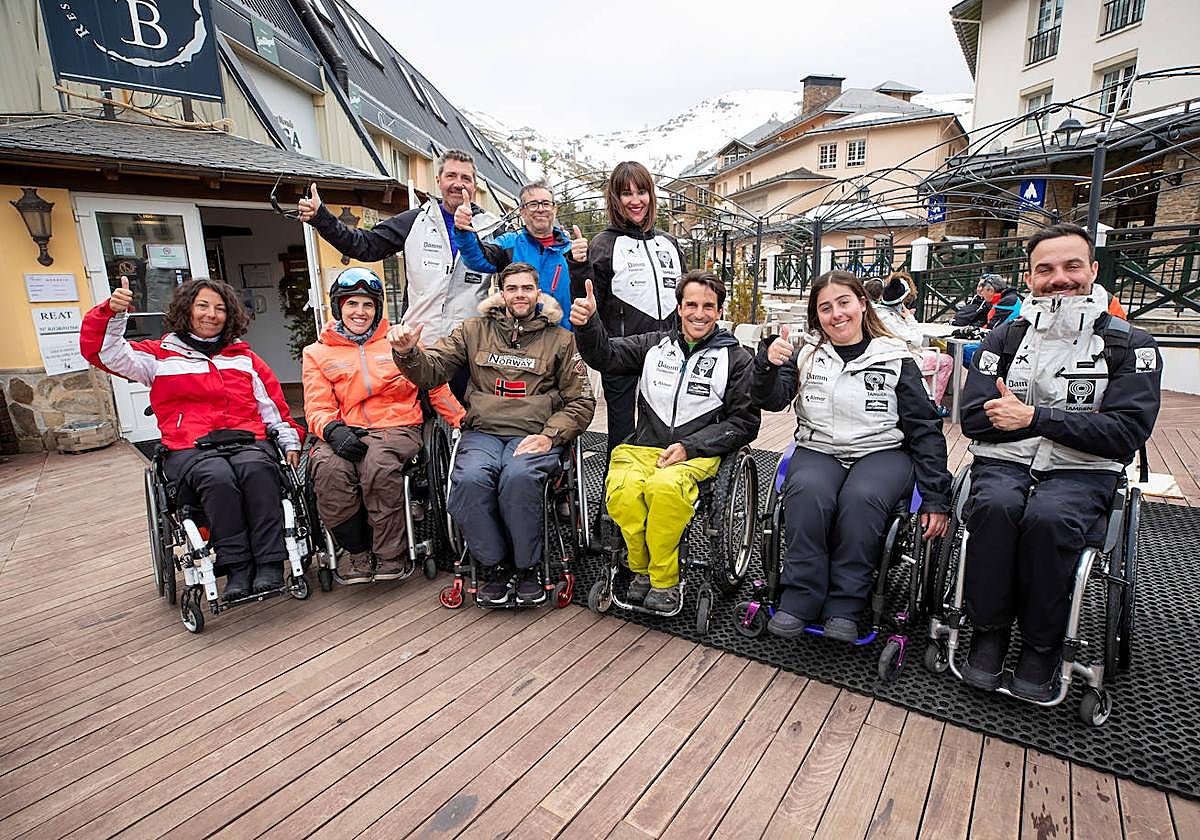A day in Granada's Sierra Nevada mountains, the cradle of adapted skiing
Fundación También encourages anyone with any type of disability, from people with blindness to those with cerebral palsy, to take part in the activities
Javier F. Barrera
Granada
Tuesday, 26 March 2024, 14:54
Do you remember the first day you ever went skiing? The snow, the cold, the equipment, the nerves, the excitement and also the doubts. Now think of the same situation for a person who is blind, who has a spinal cord injury and is in a wheelchair, in short, a person with cerebral palsy. The sensations multiply. Emotions and adrenaline, yes, but also doubts and fears.
Overcoming them is the aim of the activities taking place this week in the Sierra Nevada ski resort in Granada province. CaixaBank, official sponsor of the Spanish Paralympic Committee 2019 and an entity linked to the ADOP Paralympic Objective Sport Support Plan, has organised a two-day theoretical and practical masterclass in the Sierra Nevada for more than fifty athletes with disabilities. The programme is led by Jon Santacana and Miguel Galindo, winners of nine medals at the Paralympic Winter Games and seventeen medals in World Alpine Skiing Championships.
There are two parts to the course: adapted skiing athletes with Santacana and Galindo and the adapted skiing XVII Fundación También Sierra Nevada trophy, the Caixabank Blanca Fermández Ochoa memorial prize competition taking place over the Easter weekend, which seeks to encourage athletes with any disability to test themselves, improve and compete.
Teresa Silva, president of the También foundation, explained its purpose. "We want to bring the competition to beginner skiers who want to test their abilities in a friendly, relaxed and fun way. The good thing is that if they need to be accompanied by a teacher we give them the option, so kids can also participate."
The athletes confirm that the objective is being achieved. For example Sebas Ortega Luque, a 23-year-old student studying a double degree in Business Studies at the University of Malaga has never skied in his life. He has a spinal cord injury and now he loves skiing. "It opens many doors and removes barriers, as soon as you get on a monoski you can ski like anyone else," he said.
- How cool!
-Yes, it's freedom again, it's the feeling of being alive, from thinking I couldn't do anything to doing more things than I did before, he said smiling.
Pablo is a 37-year-old psychologist from Seville, also with a spinal cord injury. He learned to ski as a child with his father: "He used to bring me here when I was little. Then he would bring me with his friends and I moved on to snowboarding. The year I had the accident I was going to become a snowboard instructor," pablo explained.
He had the accident in June 2008, but the following winter he learned about adapted skiing and came to the Sierra Nevada to try it out. "I spent a couple of days riding in the snow." Pablo learned, improved and now competes: "I've won several Spanish championships," he said proudly.
Participatory talk
Jon Santacana said that although the course was very short, "the talk we gave was very participative, we answered many questions from people of different levels. It was a heterogeneous group from children to more advanced adults."
-What do you get asked the most?
-Very basic things at the beginning, such as fear of and respect for skiing. Those in competition want to know about psychological issues. For example, how to deal with the competition, mental preparation and the mental strength needed to compete.
Irene Villa has also taken part and she puts on her make-up for a photo as she goes down in the cable car from Borreguiles to Pradollano.
She also takes great care to put her jacket on properly so that all the sponsors' logos can be seen. "It would be impossible to ski without their help," she said. Although, she added, "Here in the Sierra Nevada Cetursa resorts treats us very well." She rubs her hands together to warm up. The day is unsettled on the high peaks of Granada's mountains, the wind is strong and it's cold.
-Irene, why do you need to go skiing?
-When you flow on a monoski, with all the adrenaline and wind in your face, you tell yourself it's the best thing you've ever done in your life (well, and being a mother, she added. We all start by falling, but it's an adventure to take risks, it's a vital learning experience. I have three children and they all ski. For me, skiing is like life. If you're scared, you fall, but if you trust in yourself, you win. And you smile. It's also related to not fighting with the mountain. There are days like today when things don't work out, so it's always a challenge and you get hooked.
-How prepared is the Sierra Nevada for adapted skiing?
-It's the best, the ski lifts are superb for us, I've never felt as good as I do here. The Sierra Nevada is the cradle of adapted skiing. It's where you see more monoskiers on the slopes. It's where I learn to ski and so do my children.
